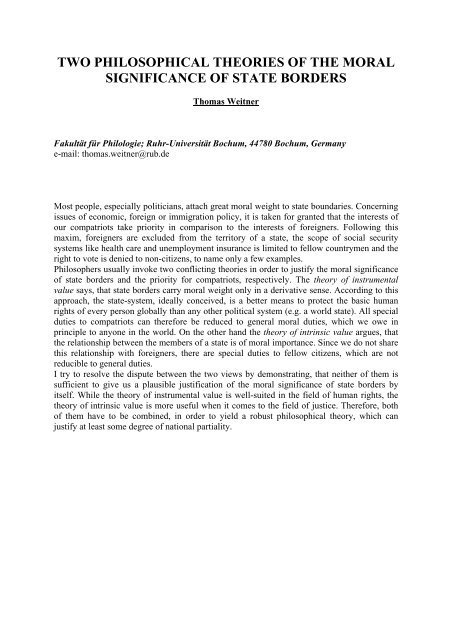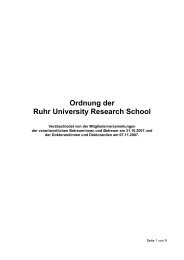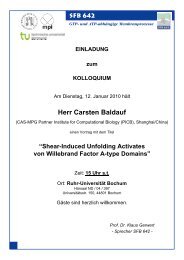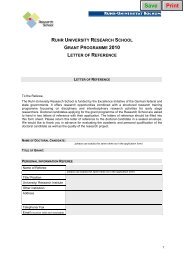Section Days abstract book 2010.indd - RUB Research School ...
Section Days abstract book 2010.indd - RUB Research School ...
Section Days abstract book 2010.indd - RUB Research School ...
Create successful ePaper yourself
Turn your PDF publications into a flip-book with our unique Google optimized e-Paper software.
TWO PHILOSOPHICAL THEORIES OF THE MORAL<br />
SIGNIFICANCE OF STATE BORDERS<br />
Thomas Weitner<br />
Fakultät für Philologie; Ruhr-Universität Bochum, 44780 Bochum, Germany<br />
e-mail: thomas.weitner@rub.de<br />
Most people, especially politicians, attach great moral weight to state boundaries. Concerning<br />
issues of economic, foreign or immigration policy, it is taken for granted that the interests of<br />
our compatriots take priority in comparison to the interests of foreigners. Following this<br />
maxim, foreigners are excluded from the territory of a state, the scope of social security<br />
systems like health care and unemployment insurance is limited to fellow countrymen and the<br />
right to vote is denied to non-citizens, to name only a few examples.<br />
Philosophers usually invoke two conflicting theories in order to justify the moral significance<br />
of state borders and the priority for compatriots, respectively. The theory of instrumental<br />
value says, that state borders carry moral weight only in a derivative sense. According to this<br />
approach, the state-system, ideally conceived, is a better means to protect the basic human<br />
rights of every person globally than any other political system (e.g. a world state). All special<br />
duties to compatriots can therefore be reduced to general moral duties, which we owe in<br />
principle to anyone in the world. On the other hand the theory of intrinsic value argues, that<br />
the relationship between the members of a state is of moral importance. Since we do not share<br />
this relationship with foreigners, there are special duties to fellow citizens, which are not<br />
reducible to general duties.<br />
I try to resolve the dispute between the two views by demonstrating, that neither of them is<br />
sufficient to give us a plausible justification of the moral significance of state borders by<br />
itself. While the theory of instrumental value is well-suited in the field of human rights, the<br />
theory of intrinsic value is more useful when it comes to the field of justice. Therefore, both<br />
of them have to be combined, in order to yield a robust philosophical theory, which can<br />
justify at least some degree of national partiality.

















